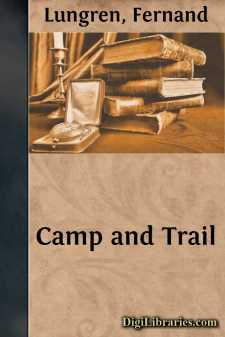Categories
- Antiques & Collectibles 13
- Architecture 36
- Art 48
- Bibles 22
- Biography & Autobiography 813
- Body, Mind & Spirit 142
- Business & Economics 28
- Children's Books 15
- Children's Fiction 12
- Computers 4
- Cooking 94
- Crafts & Hobbies 4
- Drama 346
- Education 46
- Family & Relationships 57
- Fiction 11828
- Games 19
- Gardening 17
- Health & Fitness 34
- History 1377
- House & Home 1
- Humor 147
- Juvenile Fiction 1873
- Juvenile Nonfiction 202
- Language Arts & Disciplines 88
- Law 16
- Literary Collections 686
- Literary Criticism 179
- Mathematics 13
- Medical 41
- Music 40
- Nature 179
- Non-Classifiable 1768
- Performing Arts 7
- Periodicals 1453
- Philosophy 64
- Photography 2
- Poetry 896
- Political Science 203
- Psychology 42
- Reference 154
- Religion 513
- Science 126
- Self-Help 84
- Social Science 81
- Sports & Recreation 34
- Study Aids 3
- Technology & Engineering 59
- Transportation 23
- Travel 463
- True Crime 29
Camp and Trail
by: Fernand Lungren
Categories:
Description:
Excerpt
CHAPTER I
THE WILDERNESS TRAVELER
The First QualificationMANY people have asked me what, all things considered, is the most valuable quality a wilderness traveler can possess. Always I have replied unhesitatingly; for no matter how useful or desirable such attributes as patience, courage, strength, endurance, good nature, and ingenuity, may prove to be, undoubtedly a man with them but without the sense of direction, is practically helpless in the wilds.The Sense of DirectionA sense of direction, therefore, I should name as the prime requisite for him who would become a true woodsman, depending on himself rather than on guides. The faculty is largely developed, of course, by much practice; but it must be inborn. Some men possess it; others do not—just as some men have a mathematical bent while to others figures are always a despair. It is a sort of extra, having nothing to do with criterions of intelligence or mental development, like the repeater movement in a watch. A highly educated or cultured man may lack it; the roughest possess it. Some who have never been in the woods or mountains acquire in the space of a vacation a fair facility at picking a way; and I have met a few who have spent their lives on the prospect trail, and who were still, and always would be, as helpless as the newest city dweller. It is a gift, a talent. If you have its germ, you can become a traveler of the wide and lonely places. If you have it not, you may as well resign yourself to guides.
The Sense of DirectionThe sense of direction in its simplest and most elementary phase, of course, leads a man back to camp, or over a half-forgotten trail. The tenderfoot finds his way by little landmarks, and an attempt to remember details. A woodsman adds to this the general "lay" of the country, the direction its streams ought to flow, the course the hills must take, the dip of strata, the growth of trees. So if the tenderfoot forgets whether he turns to right or left at a certain half-remembered burnt stub, he is lost. But if at the same point the woodsman's memory fails him, he turns unhesitatingly to the left, because he knows by all the logic of nature's signboards that the way must be to the left. A good mountaineer follows the half-obliterated trails as much by his knowledge of where a trail must go, as by the sparse indications that men have passed that way. I have traveled all day in the Sierras over apparently virgin country. Yet every few hours we would come on the traces of an old trail. We were running in and out of it all day; and at night we camped by it.
That is, as I have said, elementary. It has to do with a country over which your woodsman has already traveled, or about which he knows something. In the last analysis, however, it means something more.
The sense of direction will take a man through a country of which he knows nothing whatever. He travels by the feel of it, he will tell you. This means that his experience subconsciously arranges certain factors from which the sixth sense we are discussing draws certain deductions....


